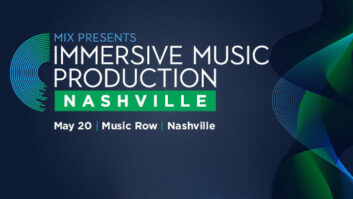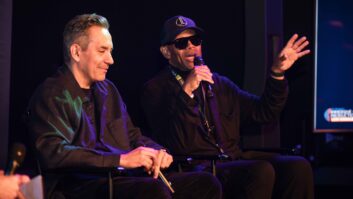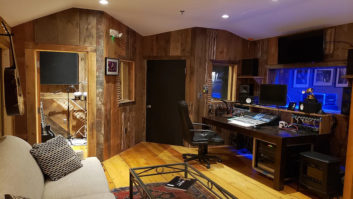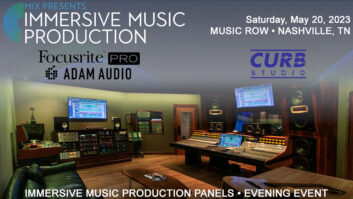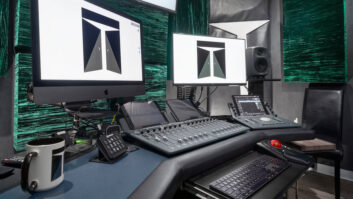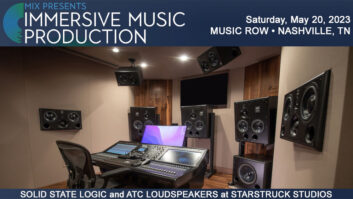Macon, GA—Macon began a major revitalization of its downtown area at the turn of the millennium, attracting investment that has ultimately led to the reopening of the birthplace of Southern rock, Capricorn Sound Studios. Now part of Mercer University and rebranded Mercer Music at Capricorn, the historic building has been reworked to include a second studio, a rehearsal complex and a museum.
Mercer University president William Underwood had a vision for creating space downtown to cultivate music talent, according to university spokesman Larry Brumley. “He had the idea for a music incubator, a place where musicians could rent rehearsal rooms and collaborate, and it could be a launching pad for talent. He saw Macon’s music legacy and asked, Why can’t it happen again?”
“A rising tide can lift all boats,” says Rob Evans, the facility’s chief engineer and studio manager, noting that the facility is open to all. “It’s a resource to the entire world. We welcome music tourists, producers, engineers, musicians. There’s a lot to see in Macon and here at Capricorn.”
The facility, which comprises four abutting buildings, was purchased in 1967 by RedWal Music, a company co-founded by Mercer graduate Phil Walden, his brother Alan, and Otis Redding. The soul singer’s untimely death in a plane crash three days after finishing overdubs on “(Sittin’ on) the Dock of the Bay” delayed the launch of Capricorn Records and its studio until 1969. The label subsequently introduced the world to Southern rock pioneers the Allman Brothers Band, Marshall Tucker Band, Charlie Daniels and Wet Willie before going bust in 1979. Over the ensuing decades, the buildings fell into disrepair.
But on Dec. 2, 2019, 50 years to the day after first opening its doors, Capricorn returned in all its 1970s splendor following a $4.3 million renovation project. While parts of the complex were close to collapse, says Brumley, the original studio and control room were largely undamaged by the ravages of time. “When we reopened, we had a lot of Capricorn alumni come back. To a person, they said the room looks the same, sounds the same and even smells the same,” he reports.
Evans says that in 2016, when Gregg Allman was receiving an honorary degree, he told president Underwood, “‘The room is perfect. Don’t change a thing.’ He also said, ‘Get an analog console,’ so we’ve honored Gregg’s request.”
Mercer Music at Capricorn’s API Sound Console Merges Classic and Modern Features, Dec. 17, 2019
The studio, a Tom Hidley design complete with compression ceiling, opened with an API console and Westlake monitors in the front soffit. Following Allman’s directive, the A room has reopened with a 40-input version of API’s 2448 analog console, the largest built by the manufacturer to date.
“We were looking at a used API with quite a history at one point,” Evans reports. “Then we thought, why don’t we get exactly what we need, brand new and under warranty? I had the DAW station put in the middle for the modern workflow.” The desk includes API’s 529C stereo bus compressor and is outfitted with Final Touch fader automation.
“We come in through the API and into 64 channels of Antelope Orion converters,” he continues. “We’re capturing into Pro Tools right now but we’re going to add 24-track 2-inch tape.”
The Mercer team added a second, 1,400-square-foot live room behind studio A’s control room. “Studio B has a different sound and feel than the historic studio,” says Evans. “The historic studio is very dead; studio B is a little more reflective. I’ve got it treated with 16 4-by-4-foot Acoustimax panels, strategically placed, and we custom-built rolling gobos.
“The room really sounds fantastic, but it does have a room sound. So for vocals, strings or a big drum sound, we can record into the B control room or take it to the patch bay of the API in studio A. We have 24 lines that feed the API and 32 feeding the B production room.”
Capricorn Sound Studios, Birthplace of Southern Rock, Returns, by Steve Harvey, Oct. 2, 2019

Since the budget wouldn’t stretch to accommodate a second API desk in the B room, Evans says, “we have an Avid C24 running Pro Tools and a nice selection of preamps and other gear, including Vintech Neve clones.” Like the A room, studio B’s control room offers Yamaha HS10 and Focal Solo6 Be nearfields, plus a Genelec 8020 5.1 system.
The new live room doubles as an event space, Evans adds. “It has a flown P.A. system, a lighting rig with moving lights and LED floods, and we have a stage we can take in and out as needed for performances. There’s also a laser projection system and a motorized screen so you can score to film.”
A complex of 12 rehearsal rooms, dubbed the Capricorn Incubator, has been constructed across two floors to facilitate the development of local music talent. It is open around the clock. Part of the second floor is additionally given over to offices, conference rooms and coworking space for creative professionals.
The complex also features 1,200 square feet of interpretive space—the Capricorn Museum—that tells the story of Capricorn and Macon’s music history through artifacts and interactive digital exhibits. “Our curator, Jared Wright, did a fantastic job. He’s maintained relationships with collectors over the years and knew where everything was and where to get it,” says Brumley.
Mercer Music at Capricorn Interior Design Throws Back to the ’70s, Oct. 7, 2019
Explore Southern Rock and the ‘Macon Sound’ at the New Museum at Capricorn, Sept. 24, 2019
One of the consultants on the renovation project, Mercer alumnus Steve Ivey, a Nashville-based multi-award-winning producer and engineer, also owns a solar company. “He put enough panels on the roof, with the help of Mercer engineering students, to power the API and the lighting in studio A,” says Evans. “And we can sell the excess back to the grid.”
Mercer Music at Capricorn is surrounded by a high-end loft development that offers accommodation for visiting recording clients, says Brumley, who notes that Macon is just 90 minutes from the airport in Atlanta. The immediate neighborhood offers brew pubs and restaurants, and the city is home to numerous historic music-related attractions, including the Big House Museum and Rosehill Cemetery, where four Allman Brothers Band members are buried, and the Otis Redding Foundation.
“There’s something in the water in places like Austin, Muscle Shoals, Memphis—a frequency, a combination of factors that make them magical—and Macon has that,” says Evans. “When you walk into this studio, you can feel it.”
Mercer Music at Capricorn • http://capricorn.mercer.edu
